George Bush has refused to comment on his knowledge of interrogation videos and their destruction by the CIA, arguing that current investigations will get to the truth.
During an end of the year news conference on Thursday, the US president was asked about the tapes, made while al-Qaeda suspects were undergoing so-called harsh interrogation.
The CIA's destruction of the tapes is currently being investigated.
"Until these inquiries are complete, until the oversight's finished, I will be rendering no opinion from the podium," Bush said.
The White House has already denied it misled anyone on who knew about the CIA's action.
The New York Times newspaper recently reported that at least four White House lawyers had participated in talks with the CIA between 2003 and 2005 about whether the tapes should be destroyed.
The paper said the lawyers' participation indicated that White House officials were more extensively involved than the Bush administration has acknowledged.
Rights groups claim that the tapes have been destroyed because they provide evidence of torture techniques, such as simulated drowning known as waterboarding.
The White House says the tapes were destroyed to protect interrogators and that the US does not practise torture.
'No comment'
Citing an ongoing investigation by the justice department and the CIA, the White House refused to discuss the focus of the Times article: whether senior advisers to Bush were aware of the tapes.
Bush said the first time he learnt of the tapes was when Michael Hayden, the CIA director, briefed him this month.
On Wednesday, Dana Perino, the White House press secretary, reiterated Bush's assertion.
"He does not recall being told about the existence of the tapes, nor their destruction before being briefed by the CIA briefer," she said.
Michael Tarazi, a legal analyst, told Al Jazeera that if Bush were found to be involved in the destruction of the tapes, it would be an impeachable offence.
The Times reported that participants in the tape discussions included Alberto Gonzales and Harriet Miers, both former White House counsels; John Bellinger, then a lawyer at the National Security Council; and David Addington, a senior adviser to Dick Cheney, the vice-president.
The CIA admitted on December 6 that it had destroyed hundreds of hours of tapes, prompting an outcry from congressional Democrats and human rights activists.
Political wrangling
On Tuesday, a US judge overruled Bush administration objections and ordered a Friday hearing into whether the CIA violated a court order when it destroyed the tapes.
The justice department had urged Henry Kennedy, a district court judge, not to investigate.
It also said that in light of other government inquiries, a judicial inquiry was inappropriate.
The government has also sought delays in congressional attempts to investigate the tapes' destruction, saying they would hamper the justice department and CIA probe.
The House of Representatives intelligence committee has drawn up subpoenas against administration officials and will issue them if they do not co-operate, a congressional aide said on Wednesday.
Legislators have accused the administration of trying to prevent the CIA from co-operating with their investigation.
Patrick Leahy, the Democratic chairman of the senate judiciary committee, accused the administration of "stonewalling".
"Every time we seem to reach a new low in this administration's arrogant flaunting of the rule of law and constitutional limits on executive power, we learn startling new revelations about the extent to which some will go to avoid accountability, undermine oversight and stonewall the truth," Leahy said.
Source: Al Jazeera and agencies
More denials and evasions from the crooks and liars in the White House even using that now famous " I can't recall" line as if we hadn't already known that Bush would continue to take the low road.
Note: On May 19, 2006, the UN Committee against Torture issued a report stating the U.S. should stop, what it concludes, is "ill-treatment" of detainees, since such treatment, according to the report, violates international law. It also calls for cessation of the US-termed "enhanced interrogation" techniques, as the UN sees these methods as a form of torture. The UN report also admonishes against secret prisons, the use of which, is considered to amount to torture as well and should be discontinued
Related Article: First subpoena issued in CIA videotapes case
Former official directed that tapes be destroyed; spy agency opens files
Dec 20, 2007
Bush sidesteps 'torture tape' issue
Subscribe to:
Post Comments (Atom)















No comments:
Post a Comment